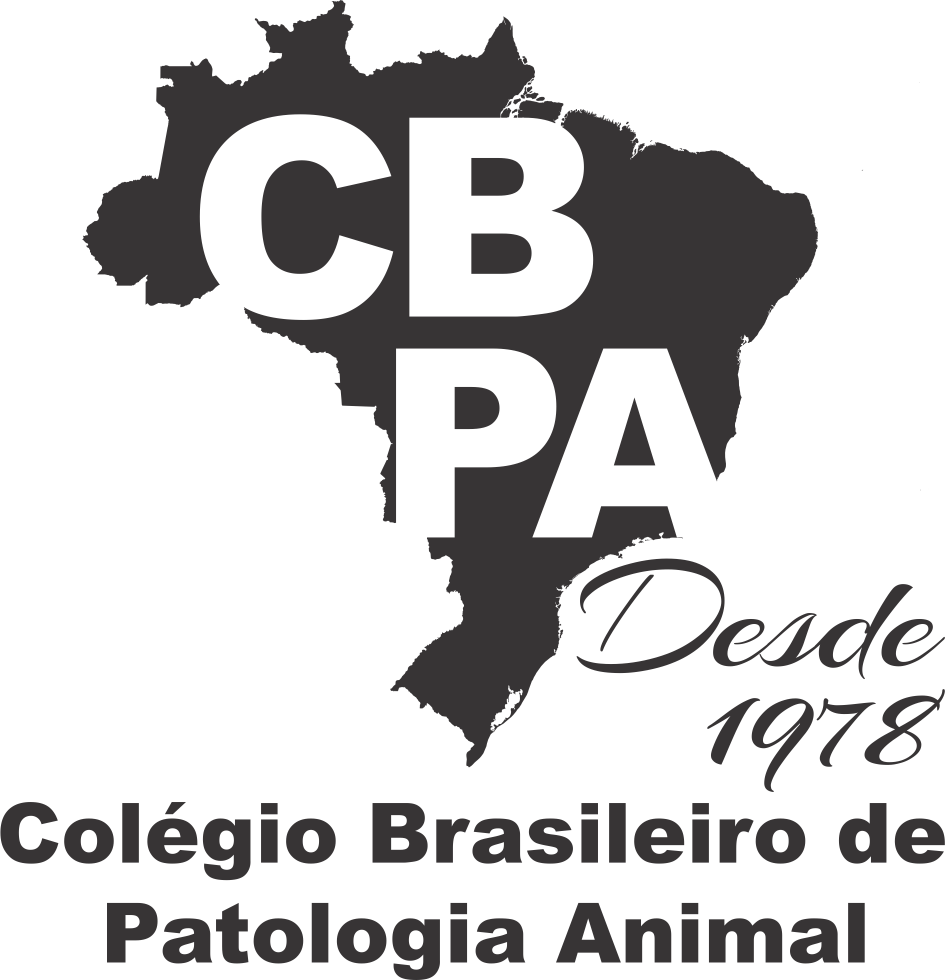Resultado da pesquisa (22)
Termo utilizado na pesquisa Costa A
#21 - Toxoplasma gondii in experimentally infected Bos taurus and Bos indicus semen and tissues, 59-64
Abstract in English:
ABSTRACT.- Scarpelli L., Lopes W.D.Z., Migani M., Bresciani K.D.S. & Costa A.J. 2009. Toxoplasma gondii in experimentally infected Bos taurus and Bos indicus semen and tissues. Pesquisa Veterinária Brasileira 29(1):59-64. Departamento de Medicina Veterinária Preventiva, Faculdade de Ciências Agrárias e Veterinárias, Universidade Estadual Paulista, Via de Acesso Prof. Paulo Donatto Castellani s/n, Jaboticabal, SP 14884-900, Brazil. E-mail: wdzlopes@hotmail.com
Eighteen young steers were inoculated with Toxoplasma gondii and randomly distributed into three groups of six animals each: GI, 2.5x105 “P” strain oocysts, GII, 5.0x106 “RH” strain tachyzoites, and GIII (Control). Clinical, serological and parasitemia exams were realized. Parasite investigation by bioassay and PCR was realized on semen and fragments of skeletal musculature, lymph nodes, brain, retina, spleen, liver, lung, testicle, epididymis and seminal vesicle. Blood and semen samples were collected on days -2, -1, 1, 3, 5, 7, 14 and weekly thereafter, up to postinfection day (PID) 84. The inoculated steers (GI and GII) presented hyperthermia from PID 3 to 16. Antibodies against T. gondii were detected through the indirect fluorescence antibody test (IFAT) on PID 5 (1:16) in both inoculated groups (oocysts and tachyzoites), reaching peaks of 1:4096 on PID 7. Parasitemia outbursts occurred in all infected bovines, principally from PID 7 to 28, independent of the strain and inoculate used. Bioassays revealed the presence of parasites in semen samples of animals infected with oocysts (GI) and tachyzoites (GII) on several experimental days between PID 7 and 84. Tissue parasitism by T. gondii was diagnosed by bioassay and the PCR technique in several organ and tissue fragments. These findings suggest the possibility of sexual transmission of T. gondii in the bovine species.
Abstract in Portuguese:
ABSTRACT.- Scarpelli L., Lopes W.D.Z., Migani M., Bresciani K.D.S. & Costa A.J. 2009. Toxoplasma gondii in experimentally infected Bos taurus and Bos indicus semen and tissues. Pesquisa Veterinária Brasileira 29(1):59-64. Departamento de Medicina Veterinária Preventiva, Faculdade de Ciências Agrárias e Veterinárias, Universidade Estadual Paulista, Via de Acesso Prof. Paulo Donatto Castellani s/n, Jaboticabal, SP 14884-900, Brazil. E-mail: wdzlopes@hotmail.com
Eighteen young steers were inoculated with Toxoplasma gondii and randomly distributed into three groups of six animals each: GI, 2.5x105 “P” strain oocysts, GII, 5.0x106 “RH” strain tachyzoites, and GIII (Control). Clinical, serological and parasitemia exams were realized. Parasite investigation by bioassay and PCR was realized on semen and fragments of skeletal musculature, lymph nodes, brain, retina, spleen, liver, lung, testicle, epididymis and seminal vesicle. Blood and semen samples were collected on days -2, -1, 1, 3, 5, 7, 14 and weekly thereafter, up to postinfection day (PID) 84. The inoculated steers (GI and GII) presented hyperthermia from PID 3 to 16. Antibodies against T. gondii were detected through the indirect fluorescence antibody test (IFAT) on PID 5 (1:16) in both inoculated groups (oocysts and tachyzoites), reaching peaks of 1:4096 on PID 7. Parasitemia outbursts occurred in all infected bovines, principally from PID 7 to 28, independent of the strain and inoculate used. Bioassays revealed the presence of parasites in semen samples of animals infected with oocysts (GI) and tachyzoites (GII) on several experimental days between PID 7 and 84. Tissue parasitism by T. gondii was diagnosed by bioassay and the PCR technique in several organ and tissue fragments. These findings suggest the possibility of sexual transmission of T. gondii in the bovine species.
#22 - Toxoplasma gondii in semen of experimentally infected swine, 430-434
Abstract in English:
ABSTRACT.- Moura A.B., Costa A.J., Jordão Filho S., Paim B.B., Pinto F.R. & Di Mauro D.C. 2007. Toxoplasma gondii in semen of experimentally infected swine. Pesquisa Veterinária Brasileira 27(10):430-434. Centro de Pesquisas em Sanidade Animal, Faculdade de Ciências Agrárias e Veterinárias, Universidade Estadual Paulista, Jaboticabal, SP 14884-900, Brazil. E-mail: a2abm@cav.udesc.br
Eight reproductive boars were divided into three groups and inoculated with Toxoplasma gondii [GI (n=3) 1.5x104 oocysts strain P; GII (n=3) 1.0x106 tachyzoites strain RH; and GIII (n=2) non-inoculated control]. Clinical, hematological, parasitemia and serological tests and studies of the parasite in the semen through bioassay and PCR, and in reproductive organs (Bioassay and immunohistochemical analyses) were conducted to evaluate the toxoplasmic infection. Blood and semen were collected on day -2, -1, 1, 3, 5, 7, 9, 11, 14 and weekly up to 84 days post-inoculation (DPI). No clinical or hematimetric alteration was observed in the boars. Parasitemia was detected in one boar inoculated with oocysts at the 7th DPI and in another boar infected with tachyzoites (GII) at the 3rd and 49th DPI. Serological tests revealed antibodies against T. gondii in animals inoculated with oocysts or tachyzoites at the 7th DPI with dilutions of 1:256 and 1:64, which reached peaks of 1:4096 at day 11 and 9, respectively. The bioassays revealed the presence of the parasite in semen samples of a boar inoculated with oocysts (GI) at 3, 49 and 56 DPI and from two boars infected with tachyzoites (GII), one animal at 5 and two animals at 49 days DPI. Mice inoculated with semen from the control group (GIII) remained serologically negative. PCR analysis showed T. gondii DNA in the semen of Boar 1 and Boar 3 inoculated with tachyzoites and oocysts, respectively. The immuno-histochemical tests showed T. gondii in the reproductive organs of Boar 1 and Boar 2, inoculated with tachyzoites and oocysts, respectively. These findings suggest the possible occurrence of venereal transmission of T. gondii in swine.
Abstract in Portuguese:
ABSTRACT.- Moura A.B., Costa A.J., Jordão Filho S., Paim B.B., Pinto F.R. & Di Mauro D.C. 2007. Toxoplasma gondii in semen of experimentally infected swine. Pesquisa Veterinária Brasileira 27(10):430-434. Centro de Pesquisas em Sanidade Animal, Faculdade de Ciências Agrárias e Veterinárias, Universidade Estadual Paulista, Jaboticabal, SP 14884-900, Brazil. E-mail: a2abm@cav.udesc.br
Eight reproductive boars were divided into three groups and inoculated with Toxoplasma gondii [GI (n=3) 1.5x104 oocysts strain P; GII (n=3) 1.0x106 tachyzoites strain RH; and GIII (n=2) non-inoculated control]. Clinical, hematological, parasitemia and serological tests and studies of the parasite in the semen through bioassay and PCR, and in reproductive organs (Bioassay and immunohistochemical analyses) were conducted to evaluate the toxoplasmic infection. Blood and semen were collected on day -2, -1, 1, 3, 5, 7, 9, 11, 14 and weekly up to 84 days post-inoculation (DPI). No clinical or hematimetric alteration was observed in the boars. Parasitemia was detected in one boar inoculated with oocysts at the 7th DPI and in another boar infected with tachyzoites (GII) at the 3rd and 49th DPI. Serological tests revealed antibodies against T. gondii in animals inoculated with oocysts or tachyzoites at the 7th DPI with dilutions of 1:256 and 1:64, which reached peaks of 1:4096 at day 11 and 9, respectively. The bioassays revealed the presence of the parasite in semen samples of a boar inoculated with oocysts (GI) at 3, 49 and 56 DPI and from two boars infected with tachyzoites (GII), one animal at 5 and two animals at 49 days DPI. Mice inoculated with semen from the control group (GIII) remained serologically negative. PCR analysis showed T. gondii DNA in the semen of Boar 1 and Boar 3 inoculated with tachyzoites and oocysts, respectively. The immuno-histochemical tests showed T. gondii in the reproductive organs of Boar 1 and Boar 2, inoculated with tachyzoites and oocysts, respectively. These findings suggest the possible occurrence of venereal transmission of T. gondii in swine.









